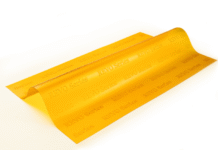Hyderabad-based flexible packaging solutions provider Shrinath Rotopack is focusing on promoting its 7-layer high barrier films in the Indian market. The company started manufacturing 7-layer films about two years ago and most of the production is at present exported.
“Most of our 7-layer films that we currently manufacture is currently being exported. However, we are looking to promote this product in the Indian market as well. Events like India Pacprocess are very useful platforms to do so,” said Vinod Kakde, head-technical sales, Shrinath Rotopack during the India Pacprocess expo which was held in Mumbai in late-October.
According to Kakde, 7-layer high barrier film can be used for packaging of edible oils, dairy products, liquids, meat, sea food, dry fruits, vacuum packaging and many other food products. At the India Pacprocess stand, Shrinath Rotopack also displayed other solutions such as retort pouches, lidding films, shaped pouches, microwavable pouches and UHT milk films, among others.
Shrinath Rotopack is also trying to move some jobs from gravure platform to CI flexo platform for which the company is in discussion with some of its customers. A couple of years ago, the company added CI flexo printing technology to its shop floor and now has two Bobst F&K 8-color presses.
In addition to the two CI flexo presses, Shrinath Rotopack has seven Rotomec rotogravure presses, seven lamination machines from Nord Meccanica and three machines made by Indian manufacturers. There are three high speed pouch making machines from Totani of Japan. The company also has seven blown film lines including two lines from Reifenhauser. In 2016, Shrinath Rotopack started its cylinder engraving plant and laser scoring. At present, the company has the capacity to manufacture 12,000 cylinders per year.
According to Kakde, the company is gradually increasing the usage of toluene-free inks. “We are using toluene-free inks when it comes to applications for the food sector. While we still use toluene-based inks in other applications, we are trying to slowly reduce it,” he said.











